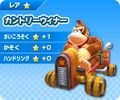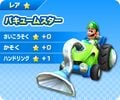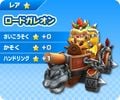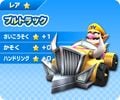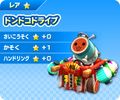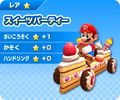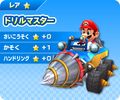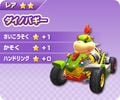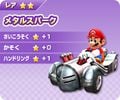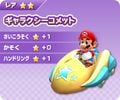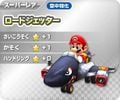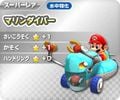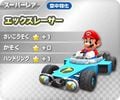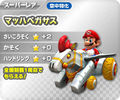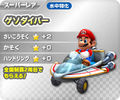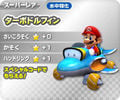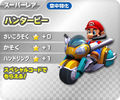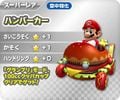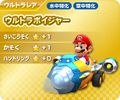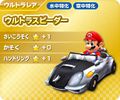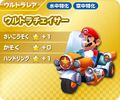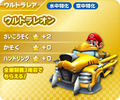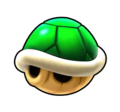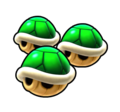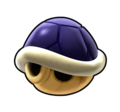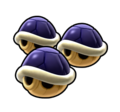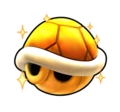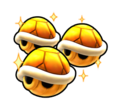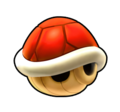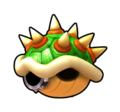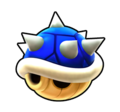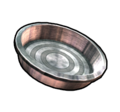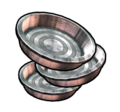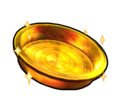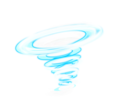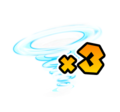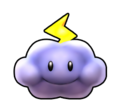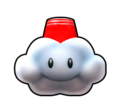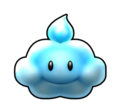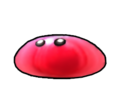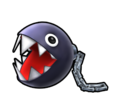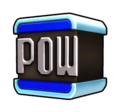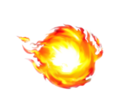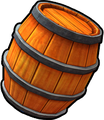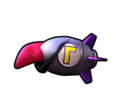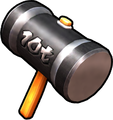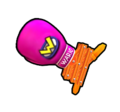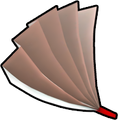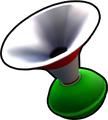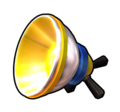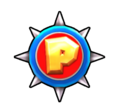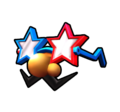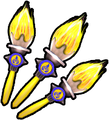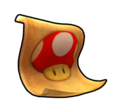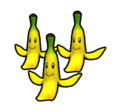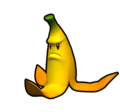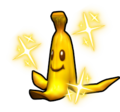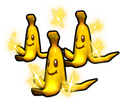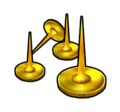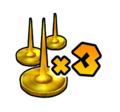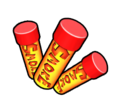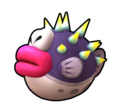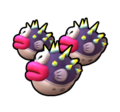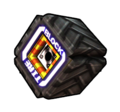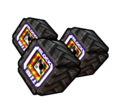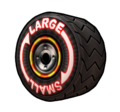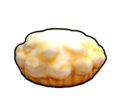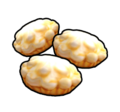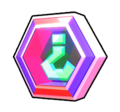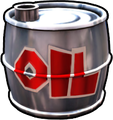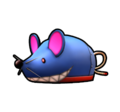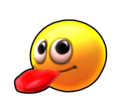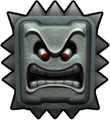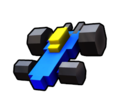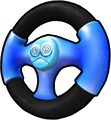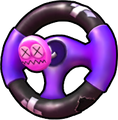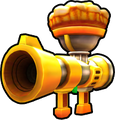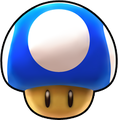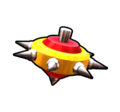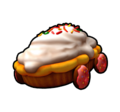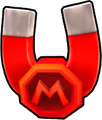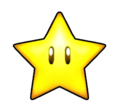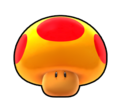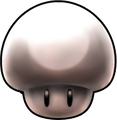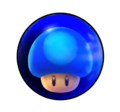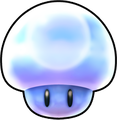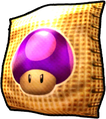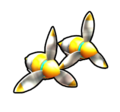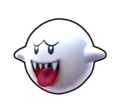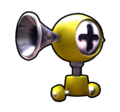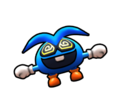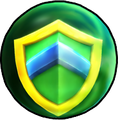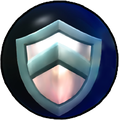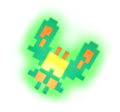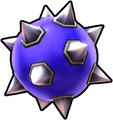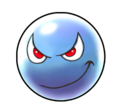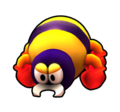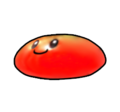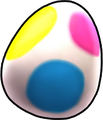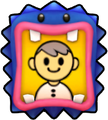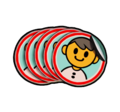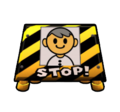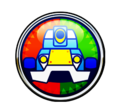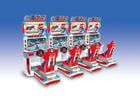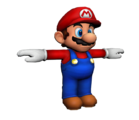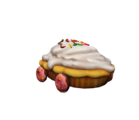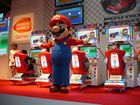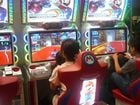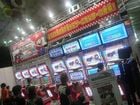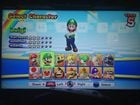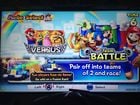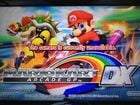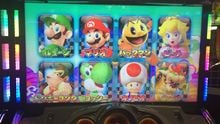Mario Kart Arcade GP DX
It has been requested that this article be rewritten. Reason: The article needs to be clearer about which specific elements were added to each version update. (tagged on December 19, 2018)
| Mario Kart Arcade GP DX | |
|---|---|
 For alternate box art, see the game's gallery. | |
| Developer | Bandai Namco Games[1] |
| Publisher | Bandai Namco Games |
| Release date | Template:Release[?] |
| Genre | Racing |
| Mode(s) | Single-player VS multiplayer (up to 4 players) Co-op multiplayer (2 players) Team multiplayer (4 players) |
| Input | Arcade: Joystick
|
Mario Kart Arcade GP DX is a Mario Kart game for arcade systems, produced by Bandai Namco Games. It is the twelfth installment in the Mario Kart franchise and the third title in the Mario Kart Arcade GP series following Mario Kart Arcade GP 2, which was a follow-up to Mario Kart Arcade GP. Just like the previous two Mario Kart Arcade GP games, it is possible to do multiplayer play by linking up to four cabinets. In 2017, another game was released called Mario Kart Arcade GP VR.
Gameplay
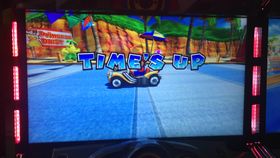
Grand Prix, National Battle, and multi-player modes are featured in the game. Unlike the other two Arcade GP releases, Time Trial is not present in the game. First the player chooses a character. Then the player can choose between seven karts, five of them being unlockable. Before starting a race, the player can take their photography and decorate it with twelve included features, such as a samurai helmet and a pirate suit. On some cases, the camera cannot be used, in which the player's photography is their selected character's portrait. The arcade operator can set whether the camera should be used or not. The player can choose to play in 50cc, 100cc and 150cc, with the latter two being unlockable. The player then must choose which one of three themed tracks (Toad, Mario, Don-chan) they want to play. Like Mario Kart Arcade GP and Mario Kart Arcade GP 2, there are only six racers in each race rather than eight or twelve, with the exception of playing Versus with 2-4 players or Team Battle with 4 players; where there are four racers. Unlike the other two Arcade GP games, the goal of Grand Prix is to finish each race in 3rd or better. Every circuit has a time limit of 250 seconds, and when the player is at first place their photography has a crown. When the player completes a lap, lights between the game screen change color. The main feature of the game is that players can now play in cooperative (with 2 players) or in teams (with 4 players), similar to Mario Kart: Double Dash!! in that a player is the driver and the second shoots items. Cooperative or team play allows the player to gain a special power-up which transforms the player's kart into a Fusion Kart that will drive and the second player is called to control the turret and shoot unlimited amounts of Green Shells at any direction for a limited period of time.[2] Fusion Karts also have health bars when playing in Team Mode with 4 players. Additionally, gameplay elements from Mario Kart 7 such as the use of gliders and underwater courses are present.
Instead of Mario Cards like the last two installments, the player can use a Banapassport Card to save their progress. The game makes extensive use of downloadable content, where over the course of five years the game will gradually have more content added through major yearly updates, so in the end there will be a total of 30 courses, 20 characters, 120 vehicles and about 150 items, increased from 10, 12, 22 and 90 respectively as long as the machine is set up to an internet connection by the operator.[3]
The in-game commentary from Mario Kart Arcade GP 2 returns and this time, it is voiced by Rica Matsumoto in the Japanese version and Jack Merluzzi in the international version.[4] Some of the quotes in this game are reused from the second game.
On July 1, 2015, update 1.04 for international version cabinets was released. It includes two new characters (Metal Mario and Rosalina) and new features, including a mode that allows a 2 on 2 team battle, mirror modes of all tracks, and improved drifting mechanics with three levels of boost. The update also changed the time limit on races in the international versions from 180 seconds to 250 seconds (which is the same for the Japanese version) and added an Advice section after a single-player race (except for when a race is timed out). Also, the update changed the point distribution for Two Player Co-op and Team Battle races.
On July 28, 2015, two new characters Baby Mario and Baby Peach were added to the Japanese version.[5][6]
On December 17, 2016, update 1.06 for international version cabinets was released. It contains several changes, such as the HUD layout being changed and Baby Mario and Baby Peach being added.
On June 6, 2017, update 1.10 for Japanese version cabinets was added two new characters (Daisy and King Boo, the latter being playable during a limited-time event that was held on October 2017).[7] The update also features the addition of the PAC-MAN Cup and its two courses. On October 2018, King Boo was released for all players.
The latest update for Japanese version cabinets was released on December 18, 2018, which added Lakitu as a playable character as well as the Donkey Kong Cup and its two courses.
On December 10th, 2020 the latest update adds a new Green Shells All you can throw game mode for the Japanese version cabinets.
Modes
The game features five modes of play, with two single-player and three multiplayer:
Grand Prix
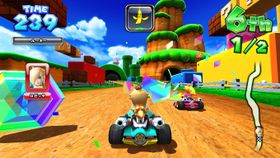
- Number of Players: 1
Grand Prix is the main mode of this game, and is a single-player mode. The player always starts in 6th place in each Grand Prix race, and the objective of Grand Prix is to finish each course in 3rd place or better within 250 seconds to go to the next course. Certain rounds have preset items while other rounds let the player choose their items. The player completes a cup by finishing each round of a cup in 3rd or better.
At first, the player can only pick 50cc, but as the player clears rounds, the 100cc and 150cc can be unlocked for play in Grand Prix mode. Also in 150cc, the number of laps to run for certain tracks (such as Splash Circuit) may increase.
When played on certain cabinets, only 100cc or 150cc Mirror is available, only one round can be played, and the Kart and Items the player gets is decided randomly.
Unlike the other two Arcade GP games, this game does not have a Challenge Minigame. Whenever a player completes a cup, they will be given the Congratulations screen.
National Battle
- Number of Players: 1
National Battle is an exclusive mode for Japanese cabinets. A new single-player mode in Mario Kart Arcade GP DX, this mode pits the player against other people in race tracks around the region. In this mode, players race to earn experience points to complete sections of the region, rank up and gain additional frames for their avatar. Here, the player selects a track to race from the limited tracks available. For each race except one-on-one battles, there are four karts competing and regardless of what cabinet number they use and who they face off against, they must always start each race in 4th place.
The goal of this mode is to complete sections of the region to earn points. A section of the region is complete once the player accumulates 100 points. The point system is as follows:
| Position | Points |
|---|---|
| 1st | 100 points |
| 2nd | 50 points |
| 3rd | 40 points |
| 4th | 30 points |
By completing all 50 sections of the region, the player is given the Congratulations screen. They will then receive special content for their performance and all sections will reset.
When this mode is played during certain times, the player may be challenged on a one-on-one battle against a tougher opponent. The player cannot select the track though, and must compete in the track selected by the opposing player. The player's objective is to win the race, if done so, the player receives a present, in which the player picks one box out of the three to earn a reward.
Versus
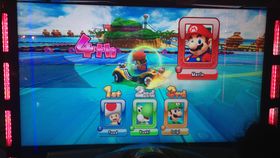
- Number of Players: 2-4
Versus, also known as Two Player Versus with two players, is a multiplayer mode in this game. By linking up to four cabinets, up to four people can take on Versus. This mode returns from the previous two Arcade GP games, and is the only mode available with three players. In this mode the players (and CPU if necessary) compete to see who can come in 1st place in a specified race track. In this mode, the players vote for a track. If two or more tracks tie for the most amount of votes the easiest track will be selected. However, if PAC-MAN Stadium or NAMCO Circuit is one of the tracks with the tied highest vote then that specific track will be selected. In the case that both PAC-MAN Stadium and NAMCO Circuit tie for the most votes then the players will race on PAC-MAN Stadium. After voting for a track, the player votes if they want to race in Normal or Mirror. If the vote is tied then the players always race in the Normal version of the track. In this mode, each player will select their three items and take their own photography, which will be displayed to the other players in the race. If a player cannot take a picture because the camera on their cabinet is disabled, the character they select will be revealed to the other players. In VS Race, Two Player Co-op and Team Battle, each player is given a color depending on which cabinet number they're on for easy identification:
| Player | Color |
|---|---|
| Player 1 | Red |
| Player 2 | Orange |
| Player 3 | Green |
| Player 4 | Blue |
| CPU | Yellow |
If less than four players gather for a race then CPU drivers are added depending on how many people join:
| No. of Players | No. of CPU | Total Karts |
|---|---|---|
| 2 Players | 2 CPU | 4 Karts |
| 3 Players | 1 CPU | 4 Karts |
| 4 Players | 0 CPU | 4 Karts |
CPUs, if any, will always start on the front spots. Then the players are arranged on the grid based on their player number, with the lower player numbers starting at a better grid spot.
Once the 1st place player finishes, the other players have 15 seconds to finish, if they don't they get the Time's Up screen. Either way, when they finish or time out, each player is given a screen which shows each player's finishing position in the race.
Only the 100cc class is available in Versus, though courses can be raced in Normal or Mirror. This also applies to the other multiplayer modes.
Two Player Co-op
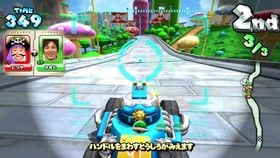
- Number of Players: 2
Two Player Co-op is a new mode to Mario Kart Arcade GP DX. As long as there are at least two cabinets are linked together, this mode can be played. Here, two players team up to race against two CPU teams of two players each. In this case there are three teams and six karts in total (of which four of them are CPU) and each team is vying for first place. Like other multiplayer modes, the players vote for a track, select their three items and take a photography. In the starting grid, the second team takes the 1st and 3rd spots, the third team takes the 2nd and 4th spots, and the human team that is team 1, starts 5th and 6th, with the 5th place starter being the lower player number. This race type has a special item that cannot be used by CPU players which is the Fusion Kart. Also, a feature exclusive to this mode in the game is the Friendship Shield, which also cannot be used by the CPU. This shield is deployed when the team's player karts are close to each other. After a race, each team scores points depending on each player's finishing position and the winner is the team who has the most points. The player can earn experience points to upgrade their Fusion Kart to a maximum level of six.
In the Japan-only update 1.10, both players will need Banapassport to play this mode.
For a list of levels and items that the Fusion Kart can fire for each level, see here.
Team Battle
- Number of Players: 4
Team Battle is a new mode to Mario Kart Arcade GP DX. This mode cannot be played in arcades that link less than four cabinets. Added in an update, this mode sees four players split into two groups of two and compete to see which team is the best. Like other multiplayer modes, the players vote for a track and take a photography. The three items that each player receives before a Team Battle race is by the Item Kart Roulette.
In this mode, the starting grid is as follows:
| Position | Player |
|---|---|
| 1st | Lower player number of Team 1 |
| 2nd | Higher player number of Team 1 |
| 3rd | Lower player number of Team 2 |
| 4th | Higher player number of Team 2 |
Like Two Player Co-op, this race type has a special item that can be used, which is the Fusion Kart. Unlike the Two Player Co-op race mode, Fusion Karts in this mode have health bars, in which if its health depletes, the tank will be destroyed and the players will take damage. It usually takes four hits to destroy the Fusion Kart. Unlike Two Player Co-op, this mode does not have the Friendship Shield feature. Just like Two Player Co-op after a race, each team scores points depending on each player's finishing position and the winner is the team who has the most points. If the players in one team finish 1st and 4th and the players in the other team finish 2nd and 3rd, the battle is considered a tie.
This mode was removed in the April 21, 2016 update. This mode is still available in cabinets that are updated to the July 1, 2015 version (no earlier or later than that).
Green Shells All You Can Throw
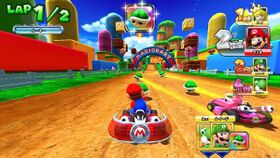
- Number of Players: 2-4
In this mode the player gets to throw unlimited green shells from start to finish (similar to Mario Kart Tour’s Frenzy Mode) but with a back protector instead of superstar or rotating items.
Team Battle Point System
When players play in Two Player Co-op or Team Battle, a point system is used to determine which team wins. The point distribution is as follows:
| Position | Old Points | New Points |
|---|---|---|
| 1st | 12 points | 10 points |
| 2nd | 8 points | 8 points |
| 3rd | 6 points | 6 points |
| 4th | 4 points | 4 points |
| 5th | 2 points | 2 points |
| 6th | 1 point | 1 point |
- Old Points refer to older versions of the game (for example, when Team Battle for 4 players didn't exist).
- New Points refer to newer versions of the game (for example, when Metal Mario existed).
Mario Coin
Mario Coin makes a return from the previous game. By collecting Mario Coins, the player can unlock new content. Also, at the completion of a race, the player earns additional Mario Coins depending on their position and the mode played. The player unlocks new content, such as Karts after earning 50 Mario Coins.
Mario Coins can also be achieved through rewards earned from winning one-on-one battles in the National Battle mode.
In the April 21, 2016 update for the Japanese cabinets for Banapassport users only, using a Continue gives the player 50 Mario Coins, called a Continue Bonus.
Techniques
Rocket Start
The Rocket Start is a technique across all Mario Kart games. The player can perform this technique by stepping on the gas pedal and holding it when "1" is displayed onscreen during the start of the race. This technique seems similar to the one used in the four recent console versions since Mario Kart DS, except that the player must perform the technique at "1", not "2".
Jumping and drifting
The player can jump by pressing the Brake while holding the gas pedal. To drift, the player does the same thing as jumping, but by turning the wheel to the desired direction. In the latest update, the player can also use the Mario button to jump.
While drifting can help shield the player against rival attacks, drifting is also the method to Drift Boosting. A new feature in the Arcade GP series, the player can charge up to a maximum of three levels and receive a Drift Boost, once the player straightens the steering wheel. The higher the level when the player straightens the steering wheel, the more effective the Drift Boost.
Playable characters
The latest version of the game features a total of 20 playable characters (9 are default, 3 are unlockable, 7 are downloadable, and 1 was unlockable for permanent use via a limited-time event).[8] Don-chan makes his Mario franchise debut, crossing over from the Taiko no Tatsujin series. Characters are divided into five weight classes (feather, light, medium, cruiser, and heavy),[9] with seven of these characters sporting alternate color swaps that allows them to access a special Item.[10] Character weight classes are listed from lightest to heaviest, and the below statistics are prior to vehicle selection (which may alter a character's statistics somewhat).
Feather
These characters have poor speed and acceleration, but exceptional handling.
Baby Mario (downloadable)
Baby Peach (downloadable)
King Boo (initially playable during a limited-time event, could be unlocked for permanent use through said event)
Light
These characters have poor speed, average acceleration, and great handling.
Blue Toad (downloadable palette swap of Toad)
Don-chan (new)
Strawberry Don-chan (downloadable palette swap of Don-chan)
Hero Don-chan (downloadable palette swap of Don-chan)
Bowser Jr. (unlockable)
Medium
These characters have poor speed, great acceleration, and average handling.
Red Yoshi (downloadable palette swap of Yoshi)
Black Yoshi (downloadable palette swap of Yoshi)
Waluigi (unlockable)
Cruiser
These characters are average in all three statistics.
Fire Mario (downloadable palette swap of Mario)
Tanooki Mario (unlockable palette swap of Mario)
Ice Luigi (downloadable palette swap of Luigi)
Pac-Man (new appearance from Template:Wikia)
Daisy (downloadable)
Heavy
These characters have great speed, but poor acceleration and handling.
Dry Bowser (downloadable palette swap of Bowser)
Wario (unlockable)
Rosalina (downloadable)
Metal Mario (downloadable)
Gold Mario (downloadable palette swap of Metal Mario)
Non-playable characters
- King Bob-omb[12]
- Fire Piranha Plants[13]
- Toads[14]
- Koopa Troopa[15]
- Cheep Cheeps
- Chain Chomp (cameo)[16]
- Goomba
- Bullet Bills
- Dolphins[17]
- Piantas
- Blooper (cameo)
- Sushi (cameo)
- Jumbo Ray
- Unagi
- Lakitu[18]
- Lantern Eel (Taiko no Tatsujin series character)
- Shy Guys
- Dry Bones[19]
- Magikoopas
- Monkeys[20]
- Parrots that resemble Squawks[20]
- Mole Miners[21] (cameo)
- Monsters (Pac-Man series characters)
- Screaming Pillars[22]
Karts
There are 29 karts to choose from (23 are default, 4 are unlockable, and 2 are downloadable), and gliders are automatically preset when selecting a kart.
Mach Pegasus (unlockable)
Blooper Diver (unlockable)
Turbo Dolphin (downloadable)
Hunter Bee (downloadable)
Hamburcar (unlockable)
Ultra Leon (unlockable)
Items
Template:More images Mario Kart Arcade GP DX has the most items out of any Mario Kart game: a grand total of 100 items. The player can only use three items per race. In the Japanese cabinets, on most cases, the player picks three items to use for the race, while in most other cabinets, the player receives a "throw forward" item, a "place behind" item, and a special item. Additionally, palette swaps of characters will enable the use of an exclusive item, only available to that swap. Only the Green Shell, Banana and Pesky Frame are available at the start in the Japanese version.
Throw-forward items
Place-behind items
Special items
Cooperate item
Courses
The game currently features 14 race tracks, of which the first 10 tracks share the general track layouts of courses in Mario Kart Arcade GP and Mario Kart Arcade GP 2 but modified significantly, mainly to alter their theme and accommodate the vehicles. Only the Mario and Bowser Cups keep their tracks' original branding; the Yoshi Cup becomes the Toad Cup, the Donkey Kong Cup becomes the Don-chan Cup, and the Waluigi Cup becomes the Bowser Jr. Cup. The downloadable Pac-Man Cup and Donkey Kong Cup have tracks with entirely different layouts compared to GP and GP 2, while the Wario and Rainbow Cups are removed entirely; it is unknown if the last two cups' courses will return through future updates in the game.
Version 1.06 update changes
The update that was released on April 21, 2016 for the Japanese cabinets and December 17, 2016 for the international cabinets received notable changes to the game (mainly the HUD). In international cabinets, it is version 1.06. The update also added two new tracks.
Features
- The Mario button will also make the kart jump.
- In the Japanese cabinets, the Two Player Co-op mode can only be played if both players have a Banapassport card.
- The Team Battle mode is removed.
- In the international cabinets after a multiplayer race, the Game Over screen does not display immediately until all cabinets have finished the black screen transition.
- The international cabinets add a notice that the photo will be deleted at the end of the race. Previously, there was no notice.
- Also, the international cabinets added a VS screen that shows all competitors participating before a multiplayer race. Previously, it would cut from the tips screen to the race.
- There is a new difficulty level for tracks beyond MASTER which is the SUPER DIFFICULT level and is in purple.
- In the international version, the announcer does not say the player numbers of the competitors before the race and will just say the characters the human players are controlling.
HUD
- The track map in the HUD was removed.
- The position indicator is replaced by a leaderboard displaying each competitor's position.
- The timer indicating the amount of seconds remaining before a Time Over in a race has disappeared with one exception: The timer still appears once ten seconds remain (previously, the time warning came on at five seconds remaining before the update). The timer still runs in the background, however; and resets to 15 seconds when the leading racer finishes.
- The lap counter was moved to the top left and now has the word "LAP" on it.
- There is now an indication which rival the player hit if an attack scores.
- It will say "Hit (player's name) with an item!" when the player scores a hit and "(player's name) hit you with an item!" when the player gets hit by an item.
- There is now a white screen transition before the race starts.
- There is now an alert whenever items are about to hit the player with an "Item approaching!" message.
References to other games
- Super Mario Bros.: The Toad Cup's tracks contain scenery based on objects and landmarks from this game.
- Super Mario World: Music on the character selection screen and course selection screen uses the beginning of the main theme from said game.
- Mario Kart: Double Dash!!: As with the previous Arcade GP games, sound effects from this title are reused, such as the race start countdown and the item roulette.
- Mario Party 6: Waluigi's artwork is reused in this game.
- Mario Party 7: Wario's artwork is reused in this game.
- Super Mario Galaxy: Bowser Jr.'s artwork is reused in this game.
- Mario Party DS: Luigi's artwork is reused in this game.
- Mario Kart Wii: Baby Mario, Baby Peach, and Rosalina's artworks are reused in this game. Also, the Mega Mushroom, Thunder Cloud, and POW Block return as items.
- Mario and Sonic at the Olympic Winter Games: Donkey Kong and Dry Bowser's artworks are reused in this game.
- New Super Mario Bros. Wii: Toad and Bowser's artworks are reused in this game.
- Fortune Street: Peach's artwork is reused in this game.
- Mario Kart 7: Gliding and underwater driving from this game are present. Also, Metal Mario's artwork is reused from this game.
- Mario Party 9: Mario and Yoshi's artworks are reused in this game.
- New Super Mario Bros. 2: Gold Mario is playable as a palette swap of Metal Mario. The design of the Scuttlebug is reused from this game.
- Super Mario 3D World: Tanooki Mario's artwork is reused in this game.
- Mario Golf: World Tour: Gold Mario's artwork (sans golf club) is reused in this game.
- Mario Kart Tour: Similar to the Frenzy Mode, infinite green shells are exclusive to the Japanese version to this game.
Staff
- Main article: List of Mario Kart Arcade GP DX staff
Gallery
Data-rendered model of Mario
Data-rendered model of a Pie Kart
Mario collecting Mario Coins on Splash Circuit
The screen that is shown if a player runs out of time
Media
| File info |
| File info |
| File info |
| File info |
| File info |
| File info |
| File info |
| File info |
| File info |
| File info |
Names in other languages
| Language | Name | Meaning | Notes |
|---|---|---|---|
| Japanese | マリオカート アーケードグランプリ デラックス[?] Mario Kāto Ākēdo Guranpuri Derakkusu |
Mario Kart Arcade Grand Prix Deluxe | |
| Chinese (simplified) | 马力欧卡丁车 大奖赛 DX[?] Mǎlì'ōu Kǎdīngchē Dàjiǎngsài DX |
Mario Kart Grand Prix DX |
Trivia
- In National Battle, the player uses customized avatars instead of photos. These avatars are reused from some of Namco Bandai Games's earlier titles, being We Ski, We Ski & Snowboard, and Go Vacation.
- Numerous characters from Dig Dug, Mappy, Galaxian, and The Tower of Druaga are seen in the Namco-themed tracks.
- In the American version of the game on cabinets of version 1.04 and later, there is an error: The character names are written in Japanese at the part of the Attract Movie (before Don-chan comes out), as well as the character order being disarranged (from left to right and from top to bottom):
- It is currently the only game in the Mario Kart franchise to not feature a Rainbow Road or similar tracks in any capacity.
References
- ^ In-game credits
- ^ Kotaku - In This New Mario Kart, You Can Drive a Tank
- ^ https://arcadeheroes.com/2014/03/25/new-details-mario-kart-arcade-gp-dxs-online-features/
- ^ https://youtu.be/D6-oyizvhho?t=59
- ^ Game updates page. Bandai Namco Entertainment. Retrieved February 12, 2020.
- ^ Update topic - Summer 2015
- ^ Update topic - Summer 2017
- ^ https://mariopartylegacy.com/2013/07/mario-kart-arcade-gp-dx-slowly-arrives-in-japan/
- ^ https://blog.goo.ne.jp/drumcan/e/3203c4f8cec19ee191fe7194c6eb30e9
- ^ https://www.amazon.co.jp/別冊てれびげーむマガジン-スペシャル-マリオカートアーケードグランプリDXスペシャル号-エンターブレインムック/dp/4047301264/ref=sr_1_1?s=books&ie=UTF8&qid=1417662589&sr=1-1&keywords=別冊てれびげーむマガジン+スペシャル
- ^ https://www.4gamer.net/games/203/G020305/20181214119/
- ^ [1]
- ^ [2]
- ^ https://www.youtube.com/watch?v=VKAJcwYVEvY
- ^ https://www.youtube.com/watch?v=VKAJcwYVEvY
- ^ https://www.youtube.com/watch?v=DPOjmAWwcJQ
- ^ https://www.youtube.com/watch?v=npYMKytD_Ns
- ^ https://www.youtube.com/watch?v=ZxWMC0J4YTo
- ^ https://www.youtube.com/watch?v=vGEuklaCzwE
- ^ a b https://www.youtube.com/watch?v=wEsEpMMybEA
- ^ https://www.youtube.com/watch?v=XufrWTaV45w&t=85s
- ^ https://www.4gamer.net/games/203/G020305/20181214119/
- ^ https://www.youtube.com/watch?v=aoJlEMbNkjo
- ^ https://www.youtube.com/watch?v=bqn_ZEYltPY
External link
- Japanese Site
- Topic about the simplified Chinese version of Mario Kart Arcade GP DX from the official WeChat account of Wahlap
- Simplified Chinese detail page from the official website for Wahlap
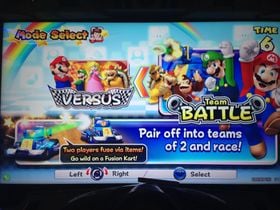









![Lakitu (downloadable)[11]](https://mario.wiki.gallery/images/thumb/b/b0/MKAGPDX_Lakitu_artwork.jpg/120px-MKAGPDX_Lakitu_artwork.jpg)



















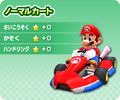
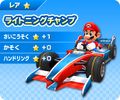
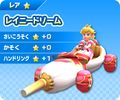
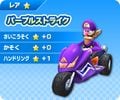
![Mash Run[23]](https://mario.wiki.gallery/images/thumb/c/c1/MKAGPDX_Toad_Kart.jpg/120px-MKAGPDX_Toad_Kart.jpg)
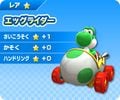
![Soul Varoon[24]](https://mario.wiki.gallery/images/thumb/f/f1/MKAGPDX_Pac-Man_Kart.jpg/120px-MKAGPDX_Pac-Man_Kart.jpg)
